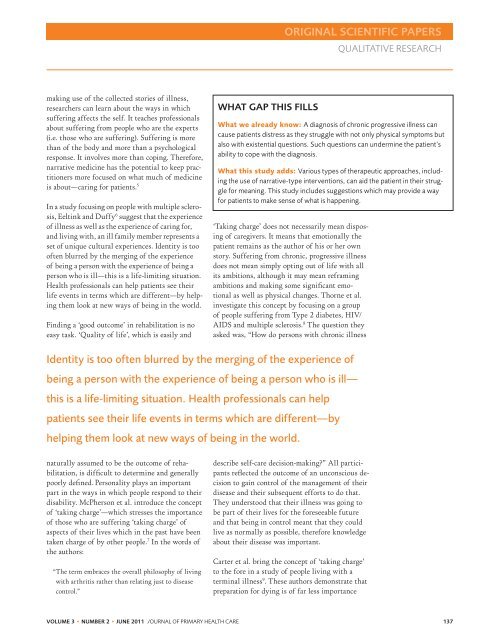single PDF of the entire issue - The Royal New Zealand College of ...
single PDF of the entire issue - The Royal New Zealand College of ...
single PDF of the entire issue - The Royal New Zealand College of ...
Create successful ePaper yourself
Turn your PDF publications into a flip-book with our unique Google optimized e-Paper software.
ORIGINAL SCIENTIFIC PAPErS<br />
quaLitative research<br />
making use <strong>of</strong> <strong>the</strong> collected stories <strong>of</strong> illness,<br />
researchers can learn about <strong>the</strong> ways in which<br />
suffering affects <strong>the</strong> self. It teaches pr<strong>of</strong>essionals<br />
about suffering from people who are <strong>the</strong> experts<br />
(i.e. those who are suffering). Suffering is more<br />
than <strong>of</strong> <strong>the</strong> body and more than a psychological<br />
response. It involves more than coping. <strong>The</strong>refore,<br />
narrative medicine has <strong>the</strong> potential to keep practitioners<br />
more focused on what much <strong>of</strong> medicine<br />
is about—caring for patients. 5<br />
In a study focusing on people with multiple sclerosis,<br />
Eeltink and Duffy 6 suggest that <strong>the</strong> experience<br />
<strong>of</strong> illness as well as <strong>the</strong> experience <strong>of</strong> caring for,<br />
and living with, an ill family member represents a<br />
set <strong>of</strong> unique cultural experiences. Identity is too<br />
<strong>of</strong>ten blurred by <strong>the</strong> merging <strong>of</strong> <strong>the</strong> experience<br />
<strong>of</strong> being a person with <strong>the</strong> experience <strong>of</strong> being a<br />
person who is ill—this is a life-limiting situation.<br />
Health pr<strong>of</strong>essionals can help patients see <strong>the</strong>ir<br />
life events in terms which are different—by helping<br />
<strong>the</strong>m look at new ways <strong>of</strong> being in <strong>the</strong> world.<br />
Finding a ‘good outcome’ in rehabilitation is no<br />
easy task. ‘Quality <strong>of</strong> life’, which is easily and<br />
WHAT GAP THIS FILLS<br />
What we already know: A diagnosis <strong>of</strong> chronic progressive illness can<br />
cause patients distress as <strong>the</strong>y struggle with not only physical symptoms but<br />
also with existential questions. Such questions can undermine <strong>the</strong> patient’s<br />
ability to cope with <strong>the</strong> diagnosis.<br />
What this study adds: Various types <strong>of</strong> <strong>the</strong>rapeutic approaches, including<br />
<strong>the</strong> use <strong>of</strong> narrative-type interventions, can aid <strong>the</strong> patient in <strong>the</strong>ir struggle<br />
for meaning. This study includes suggestions which may provide a way<br />
for patients to make sense <strong>of</strong> what is happening.<br />
‘Taking charge’ does not necessarily mean disposing<br />
<strong>of</strong> caregivers. It means that emotionally <strong>the</strong><br />
patient remains as <strong>the</strong> author <strong>of</strong> his or her own<br />
story. Suffering from chronic, progressive illness<br />
does not mean simply opting out <strong>of</strong> life with all<br />
its ambitions, although it may mean reframing<br />
ambitions and making some significant emotional<br />
as well as physical changes. Thorne et al.<br />
investigate this concept by focusing on a group<br />
<strong>of</strong> people suffering from Type 2 diabetes, HIV/<br />
AIDS and multiple sclerosis. 8 <strong>The</strong> question <strong>the</strong>y<br />
asked was, “How do persons with chronic illness<br />
Identity is too <strong>of</strong>ten blurred by <strong>the</strong> merging <strong>of</strong> <strong>the</strong> experience <strong>of</strong><br />
being a person with <strong>the</strong> experience <strong>of</strong> being a person who is ill—<br />
this is a life-limiting situation. Health pr<strong>of</strong>essionals can help<br />
patients see <strong>the</strong>ir life events in terms which are different—by<br />
helping <strong>the</strong>m look at new ways <strong>of</strong> being in <strong>the</strong> world.<br />
naturally assumed to be <strong>the</strong> outcome <strong>of</strong> rehabilitation,<br />
is difficult to determine and generally<br />
poorly defined. Personality plays an important<br />
part in <strong>the</strong> ways in which people respond to <strong>the</strong>ir<br />
disability. McPherson et al. introduce <strong>the</strong> concept<br />
<strong>of</strong> ‘taking charge’—which stresses <strong>the</strong> importance<br />
<strong>of</strong> those who are suffering ‘taking charge’ <strong>of</strong><br />
aspects <strong>of</strong> <strong>the</strong>ir lives which in <strong>the</strong> past have been<br />
taken charge <strong>of</strong> by o<strong>the</strong>r people. 7 In <strong>the</strong> words <strong>of</strong><br />
<strong>the</strong> authors:<br />
“<strong>The</strong> term embraces <strong>the</strong> overall philosophy <strong>of</strong> living<br />
with arthritis ra<strong>the</strong>r than relating just to disease<br />
control.”<br />
describe self-care decision-making” All participants<br />
reflected <strong>the</strong> outcome <strong>of</strong> an unconscious decision<br />
to gain control <strong>of</strong> <strong>the</strong> management <strong>of</strong> <strong>the</strong>ir<br />
disease and <strong>the</strong>ir subsequent efforts to do that.<br />
<strong>The</strong>y understood that <strong>the</strong>ir illness was going to<br />
be part <strong>of</strong> <strong>the</strong>ir lives for <strong>the</strong> foreseeable future<br />
and that being in control meant that <strong>the</strong>y could<br />
live as normally as possible, <strong>the</strong>refore knowledge<br />
about <strong>the</strong>ir disease was important.<br />
Carter et al. bring <strong>the</strong> concept <strong>of</strong> ‘taking charge’<br />
to <strong>the</strong> fore in a study <strong>of</strong> people living with a<br />
terminal illness 9 . <strong>The</strong>se authors demonstrate that<br />
preparation for dying is <strong>of</strong> far less importance<br />
VOLUME 3 • NUMBER 2 • JUNE 2011 J OURNAL OF PRIMARY HEALTH CARE 137

















